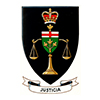Education for Judges
Judicial education is a key priority for the Ontario Superior Court of Justice. Our judges regularly participate in continuing education programs to stay on top of current developments in substantive and procedural law, social context, and judicial ethics.
The Ontario Superior Court of Justice’s commitment to judicial education begins when a judge is newly appointed. Each new judge is assigned a senior judge as a judicial mentor. The new judge is also given the opportunity to shadow experienced colleagues in the core areas of the Court’s work – civil, family, and criminal law.
Newly appointed judges are also required to follow a training program in their first five years of judging. The program has been specially designed by the National Judicial Institute, an independent, judge led organization dedicated to judicial education.
Ongoing Judicial Education
Ontario Superior Court judges are expected to devote a minimum of 10 days per year to judicial education. They are also expected to maintain a professional development plan. Judges of the Superior Court attend two mandatory judicial education conferences annually. There is also one full day each year devoted to providing education to judges of the Family Court on child protection issues. These conferences are organized by the Ontario Superior Court Education Committee and the National Judicial Institute. The National Judicial Institute also provides ongoing judicial education, designed to support the continuing professional development of Ontario judges at every stage of their career.
The Superior Court of Justice prioritizes education on social context. In recent years, this social context education has included:
- Sexual assault law which is mandatory for all new judges who are also assigned a mentor and is available to all judges.
- Education on Intimate Partner Violence including, among other topics, training on coercive control in intimate partner and family relationships and the impacts of this violence on children;.
- The Truth and Reconciliation Commission’s Report and its Calls to Action.
- LGBTQ+ issues.
- The experiences of young people who have spent time in the foster care system.
- First Nations, Inuit, and Métis issues in the context of child protection cases.
- Cultural competence and unconscious bias education.
- Substance use disorders and mental health issues.
Finally, Judges of the Ontario Superior Court of Justice are frequent presenters or panelists at judicial and legal conferences throughout Canada, and internationally.
